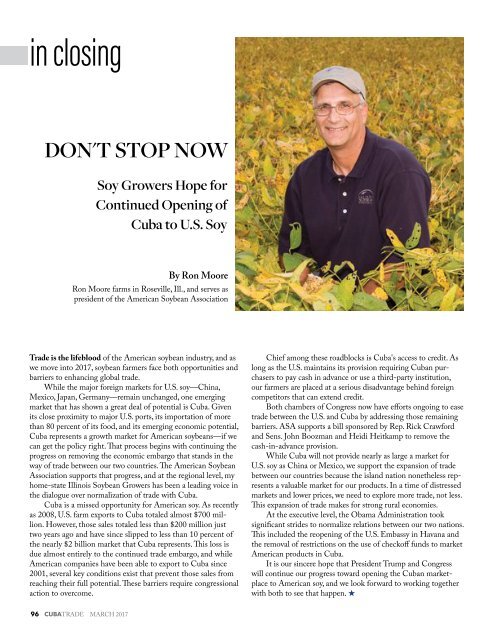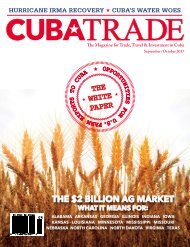You also want an ePaper? Increase the reach of your titles
YUMPU automatically turns print PDFs into web optimized ePapers that Google loves.
in closing<br />
DON'T STOP NOW<br />
Soy Growers Hope for<br />
Continued Opening of<br />
Cuba to U.S. Soy<br />
By Ron Moore<br />
Ron Moore farms in Roseville, Ill., and serves as<br />
president of the American Soybean Association<br />
Trade is the lifeblood of the American soybean industry, and as<br />
we move into 2017, soybean farmers face both opportunities and<br />
barriers to enhancing global trade.<br />
While the major foreign markets for U.S. soy—China,<br />
Mexico, Japan, Germany—remain unchanged, one emerging<br />
market that has shown a great deal of potential is Cuba. Given<br />
its close proximity to major U.S. ports, its importation of more<br />
than 80 percent of its food, and its emerging economic potential,<br />
Cuba represents a growth market for American soybeans––if we<br />
can get the policy right. That process begins with continuing the<br />
progress on removing the economic embargo that stands in the<br />
way of trade between our two countries. The American Soybean<br />
Association supports that progress, and at the regional level, my<br />
home-state Illinois Soybean Growers has been a leading voice in<br />
the dialogue over normalization of trade with Cuba.<br />
Cuba is a missed opportunity for American soy. As recently<br />
as 2008, U.S. farm exports to Cuba totaled almost $700 million.<br />
However, those sales totaled less than $200 million just<br />
two years ago and have since slipped to less than 10 percent of<br />
the nearly $2 billion market that Cuba represents. This loss is<br />
due almost entirely to the continued trade embargo, and while<br />
American companies have been able to export to Cuba since<br />
2001, several key conditions exist that prevent those sales from<br />
reaching their full potential. These barriers require congressional<br />
action to overcome.<br />
Chief among these roadblocks is Cuba's access to credit. As<br />
long as the U.S. maintains its provision requiring Cuban purchasers<br />
to pay cash in advance or use a third-party institution,<br />
our farmers are placed at a serious disadvantage behind foreign<br />
competitors that can extend credit.<br />
Both chambers of Congress now have efforts ongoing to ease<br />
trade between the U.S. and Cuba by addressing those remaining<br />
barriers. ASA supports a bill sponsored by Rep. Rick Crawford<br />
and Sens. John Boozman and Heidi Heitkamp to remove the<br />
cash-in-advance provision.<br />
While Cuba will not provide nearly as large a market for<br />
U.S. soy as China or Mexico, we support the expansion of trade<br />
between our countries because the island nation nonetheless represents<br />
a valuable market for our products. In a time of distressed<br />
markets and lower prices, we need to explore more trade, not less.<br />
This expansion of trade makes for strong rural economies.<br />
At the executive level, the Obama Administration took<br />
significant strides to normalize relations between our two nations.<br />
This included the reopening of the U.S. Embassy in Havana and<br />
the removal of restrictions on the use of checkoff funds to market<br />
American products in Cuba.<br />
It is our sincere hope that President Trump and Congress<br />
will continue our progress toward opening the Cuban marketplace<br />
to American soy, and we look forward to working together<br />
with both to see that happen. H<br />
96 CUBATRADE MARCH 2017
















